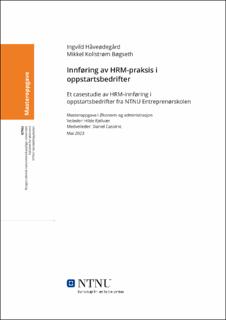| dc.description.abstract | Oppstartsbedrifter sikrer arbeidsplasser og innovasjon i Norge, og står for en stor del av verdiskapningen. Human Resource Management vil ha en sentral rolle i organisasjonsutvikling og innovasjon med klare rutiner og prosesser, mens oppstartsbedrifter karakteriseres av uformelle prosesser. Derfor vil vi se nærmere på hvilke HRM-praksiser oppstartsbedrifter innfører, dets fremmende og hemmende faktorer samt deres positive tilføringer. I studien tar vi utgangspunkt i oppstartsbedrifter fra NTNU Entreprenørskolen. For å kartlegge oppgavens tema har vi utviklet følgende forskningsspørsmål:
1. Hvilke HRM-praksiser innfører oppstartsbedriftene, og hva fremmer behovet for innføringen av dem?
2. Hvilke faktorer virker hemmende for HRM-innføringen i oppstartsbedriftene?
3. Hva tilfører innføringen av ulike HRM-praksiser for oppstartsbedriftene?
Vi har gjennomført et kvalitativt studie der vi har gjennomført dybdeintervjuer med 13 respondenter fra syv ulike oppstartsbedrifter. For å få et dypt innblikk i temaet har vi intervjuet både ledere og ansatte hos oppstartsbedrifter med ulik levetid. Dybdeintervjuenes funn utgjør det empiriske fundamentet i oppgaven, og sammen med teori om oppstartsbedrifter og HRM dannes grunnlaget for forskningsprosjektets diskusjon.
Studiens funn viser at oppstartsbedriftene innfører HRM-praksiser som kan kategoriseres som rekruttering, onboarding, samhandlig og utvikling. Deres fremmende faktorer er lederens erfaring, bedriftens vekstadie, antall ansatte og bransjens karakteristikk. Når det gjelder hemmende faktorer er det miljøusikkerhet, lederens roller og balanse samt ressursbegrensning og tidspress som vanskeliggjør HRM-innføringen i oppstartsbedriftene. Til slutt fant vi at positive tilføringer ved HRM-praksiser påvirker både bedriften som helhet, og de ansatte individuelt. På bedriftsnivå fant vi en økt ytelse, godt omdømme og støttende organisasjonskultur. På individuelt nivå fant vi en økt ytelse, økt motivasjon og høyere engasjement. Dessuten fant vi også samspillseffekter mellom de to nivåene. | |
| dc.description.abstract | Start-up companies ensure jobs and innovation in Norway, and contribute significantly to svalue creation. Human Resource Management (HRM) have a central role in organizational development and innovation through formal rutines and processes, while start-ups on the other hand are characterized by informal processes. Therefore, we will take a closer look at which HRM-practices start-ups adopt, its facilitating and inhibiting factors, as well as their positive additions. In this study, we focus on start-up companies that originated from the NTNU School of Entrepreneurship. In order to explore the topic of our thesis, we have developed the following research questions:
1. Which HRM-practises do the start-up companies adopt, and what promotes the need for their implementation?
2. Which factors hinder the implementation of HRM in start-up companies?
3. What are the contributions of implementing different HRM practices to start-up
companies?
We conducted a qualitative study that consisted of 13 in-depth interviews from seven different start-up companies. To gain a deep insight of the topic, we interviewed both managers and employees from start-up companies at various stages of their lifecycle. The findings from the in-depth interviews form the empirical foundation of this study. And together with theory on start-up companies and HRM, they form the basis for the discussion in this research project.
The findings of the study show that start-up companies adopt HRM practices that can be categorized as recruitment, onboarding, collaboration, and development. Their facilitating factors include the leader's experience, the company's growth stage, the number of employees, and industry characteristics. Regarding inhibiting factors, environmental uncertainty, the leader's roles and balance, resource constraints, and time pressure make the implementation of HRM challenging in start-up companies. Finally, we found that the positive contributions of HRM practices affect both the overall company and individual employees. At the company level, we observed increased performance, a good reputation, and a supportive organizational culture. At the individual level, we found increased performance, enhanced motivation, and higher engagement. Additionally, we also identified interaction effects between the two levels. | |
